The Bones of All Men
by Philip Pickett and Richard Thompson
[Music CD]
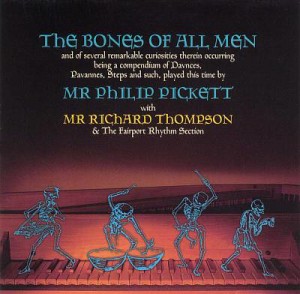
view/request
This album marries two of my favorite genres of music: specifically, 16th century Renaissance dances and British folk-rock of the 1960s and ’70s.
Richard Thompson and some ex-Fairport Convention comrades joined conductor and multi-instrumentalist Philip Pickett (who has Albion Band credentials as well as early music) in 1998 to rock out on a selection of tunes by William Byrd’s contemporaries. When I used to play electric harpsichord for English Country Dancing back in the early ’90s, this was the sort of sound I dreamed of achieving. Imagine a note-perfect recorder consort accompanied by Dave Mattacks on drums, or dueling krumhorn and electric guitar, or virginal with a very electrified bass continuo. The tunes are brilliantly arranged, irresistibly driving, reverently irreverent (or vice versa), passionately fun and absolutely classic in every sense of the word. Turn it up, way up.
Reviewed by Faith
Tagged: Early music, Rock music
Return To Cookie Mountain
[Music CD]
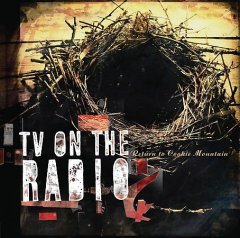
view/request
Return To Cookie Mountain (2006), by the Brooklyn-based quintet TV On The Radio, was my introduction to this group’s music and I quickly became a fan. I really enjoy the unique harmonies and vocal layerings of the two primary vocalists Tunde Adebimpe and Kyp Malone. The melodies are also exceptional and have been described as “atmospheric” and “spacious” Their music is not easy to categorize but some close approximations include: indie-rock, soul and trip-hop. Repeated listenings to this CD always reveal more pleasurable discoveries of their unique sound. Two outstanding tracks for me are “I Was A Lover” and “A Method”.
Reviewed by Susana
Tagged: Indie rock, Rock music
A Wizard, A True Star
by Todd Rundgren
[Music CD]
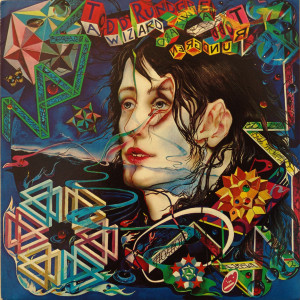
view/request
Todd Rundgren, hot off the heels of Something/Anything? and its hits “Hello It’s Me” and “I Saw the Light”, released an experimental album called A Wizard, A True Star in 1973. The record is a strangely assembled pastiche of synthesizer driven pop songs, homages to Disney soundtracks and wacky Spike Jones records, soul covers and dark, personal compositions.
Nearly all of the songs run together on this recording creating a frantic, but inspired listening experience. Ever the innovative musician and producer, Rundgren’s engaging arrangements and subtle overdubs make this record a gratifying headphone listen.
Reviewed by Jason
Tagged: Experimental, Rock music
Live at the Star Club Hamburg
by Jerry Lee Lewis
[Music CD]
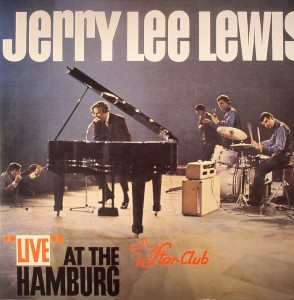
view/request
Live albums are always tricky; sure, a lot of your favorite songs appear on the track listing, but often the magic isn’t quite there. Artists often issue live recordings as an inexpensive way to fulfill contracts with their record labels. A certain magic can be missing from the original studio recording or you’re just left with poor sound quality.
Live at the Star Club Hamburg happens to be one of the exceptions to this trend. Backed by the Nashville Teens, Jerry Lee Lewis delivers one of the fiercest live concerts that has ever been captured on tape. The piano, much like the drums, is an instrument where physicality can be a variable. A musician’s force has much to do with the overall sound. Jerry Lee, sounding possessed (and possibly a little in the bag), pounds like a piano with fury and rage like it’s his last night to raise hell on Earth.
For some context, it’s 1964 and the the British Invasion is in full force. The Beatles had taken Hamburg by storm a couple of years back. Army stints, jail time, religious conversion and death put an end to most of the original 1950’s rockers. The Killer also had his share of controversy when he married his 13 year old cousin while still legally bound to another woman. The days of chart topping hits probably seemed like a distant past.
What does Jerry Lee do then? Well, he heads out to a small stage in Hamburg and plays one of the most aggressive sets ever heard. The crowd is in a frenzy throughout his set chanting “Jerry! Jerry! Jerry!” while he rolls over songs that were personal hits like “Great Balls of Fire” and “Whole Lotta Shakin’ Goin’ On” and popular favorites of his contemporaries such as “Long Tall Sally”, “Matchbox” and “Hound Dog”. Essentially, he’s delivering a similar song selection as the Liverpudlians brought with them to Germany; only Lewis is far more aggressive and is perhaps trying to prove that he’s an original rocker.
Fans of 50’s rock n’ roll will certainly enjoy this record. I also feel comfortable recommending Live at the Star Club Hamburg to fans of more raw groups like the Stooges or the MC5.
Reviewed by Jason
Tagged: 1950s rock music, Live recordings
Plastic Ono Band
by John Lennon
[Music CD]
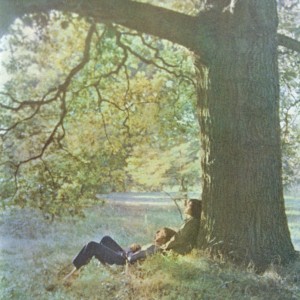
view/request
The Plastic Ono Band LP is commonly referred to as the “Primal Scream” album as John and Yoko were going through Arthur Janov’s Primal Scream therapy during the album’s creation in 1970. While Lennon’s lyrics had been hinting at the pain of his childhood since “Help” and “I’m a loser”, on Plastic Ono Band he becomes overtly confessional and addresses directly the disillusionment and isolation of fame and the overwhelming pain of his youth. The cryptic and surreal wordplay that characterized many of John’s contributions to the Beatles albums of the late 60’s is abandoned here and the results are split equally between straightforward quiet love songs (“Hold on”, “Love” and “Look at Me” which more closely resemble his fingerpicked contributions from 1968 such as “Julia” and “Dear Prudence”), filthy distorted rockers (“I Found out” and “Well, Well, Well” which share the heavy tube distortion sounds of “Revolution” and “Cold Turkey”) and epic declarations of loss and rebirth (“Mother” and “God”, both of which feature ‘simple’ piano/bass/drums arrangements). Released in October 1970, in the wake of Altamont, Manson and Kent State, “Plastic Ono Band” addresses the disillusionment of the end of the sixties, the break-up and dispelling of the Beatles myth and the tragedies of John’s childhood. Opening with the intense primal therapy of “Mother” (in which John finally overtly addresses his feelings of abandonment as a child and his mother’s sudden death just as they were reconciling) and closing with the myth-busting “God”, the album is easily Lennon’s most cohesive solo work. Lennon famously hated the sound of his own voice unadorned, and was constantly imploring producers to swathe it in reverb or other effects, and his most famous Beatles contributions were often dense, sonically experimental psychedelic studio creations. On Plastic Ono Band, stripped of daft wordplay and overproduction (Phil Spector, who produced half the sessions, is most notable here for his uncharacteristic restraint), with exceptional accompaniment by Ringo Starr, Billy Preston and Klaus Voorman, Lennon produces his most complete raw and honest solo work.
Reviewed by Dylan
Tagged: Beatles, Classic rock, John Lennon
Electric Ladyland
by The Jimi Hendrix Experience
[Music CD]
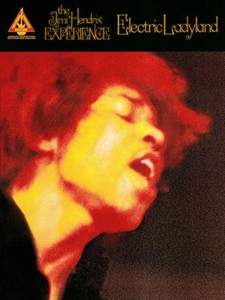
view/request
You find yourself alone, lying in a field of flowers. You’ve just been awoken by the distant pounding of what sounds like a tympani. Looking ahead, your feet seem miles away and a group of bunnies are gnawing on your blue jeans. Jimi once rapped, “Ho hum. I’m as good as bunnies- and you know how good bunnies are.” Just shake ‘em off, brother or sister; they’re just hungry after a long, hot summer night. The drum fades and nature, and in fact everything you hear as well, is moving backward. Fear not, you’re in Electric Ladyland, friend. Have you ever been?
Take out that note from your back pocket. No matter the urge to call the telephone number written on there, trust me, you don’t want to see Little Miss Strange again. Rip it to shreds.
Spend the next fifteen minutes drying yourself off from the still raining, still dreaming sky with the Experience in concert, floating somewhere in the the astral plane. “Voodoo Chile” is the jam. Look left and see a Marshall stack and a white Fender Strat resting comfortably. It’s been tuned and awaiting on you, man. Put the strap on over your shoulder (and make sure you’re going lefty), pick the open A-string (that’s the second heaviest on the axe), let it ring and move on over toward the amplifier. Things will start buzzing and feeding back some brilliant musical colors and waveforms. Mitch and Noel should be launching off that any minute now.
A singular door will appear in the middle of the field somewhere behind you. Open it and look out into outer-space with those Gypsy eyes. Grab the burning midnight lamp, step out and be mindful of the crosstown traffic. Mr. Dylan’s “All Along the Watchtower” is your soundtrack… and your guide, baby.
Keep the sounds of Electric Ladyland steady and you’ll find your way.
Reviewed by Jason
Tagged: Classic rock, Psychedelic
Histoire de Melody Nelson
by Serge Gainsbourg
[Music CD]
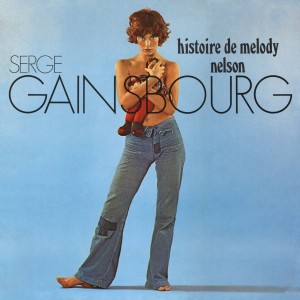
view/request
The master melodist and provocateur, Serge Gainsbourg introduced a revolutionary recording with 1971’s Histoire de Melody Nelson. The French pop star abandoned an archetypal singing style in place of a soft and nearly spoken word delivery. This was achieved by the singer’s smokey, baritone voice captured by close microphone placement. The music behind this voice is expressive and experimental with shades of psychedelia. Groovy (and yes, there’s really no other way of putting it) electric bass lines, freak out fuzz guitar and busy drums supply the basic tracks that are augmented by a choral and haunting string score by Jean-Claude Vannier.
Jane Birkin, Gainsbourg’s then wife, appears on the front cover and also provides the voice of Melody Nelson. You see, this is a concept record. It tells a Lolita-esque tale of a middle-aged man out driving who accidentally hits a bicycling British girl. The man falls in love with his victim and a love affair follows. Melody soon decides to fly home and the man, now devastated, performs an African Cargo Cult ritual to make his love return. His desperation proves to be tragic as he discovers that this act of mysticism caused an airplane crash.
The songs of Serge Gainsbourg, and the Melody Nelson album in particular, have inspired many musicians including Air, Jarvis Cocker, Beck, Portishead, Sean Lennon and the Divine Comedy. Rarely has the marriage of lyrical ingenuity and musical arrangement been achieved in popular music.
Reviewed by Jason
Tagged: French language, World music
The Ditty Bops
by The Ditty Bops
[Music CD]
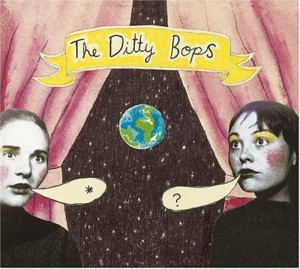
view/request
I enjoyed this band so much the first time I heard them (live, at Pearl Street) that I bought five copies of their self-titled album; I kept one copy for myself and gave the rest as Christmas gifts. This is fun music. Amanda Barret and Abby DeWald excel at quirky lyrics and tight vocal harmonies, and these two very competent musicians (in addition to their fine singing Abby plays guitar and Amanda plays mandolin and dulcimer) are backed up by an excellent band that really knows how to swing. They play in a variety of styles; swing, blues, and ragtime are among their more obvious influences.
I love the sound of this album, but I also love the words to many of the songs. The lyrics can change from nonsensical, to mundane, to profound all in the course of a song, and a song like “Walk or Ride” does all of these while addressing an issue that is dear to my heart.
Reviewed by Ben
Tagged: Folk music
Spooked
by Robyn Hitchcock
[Music CD]
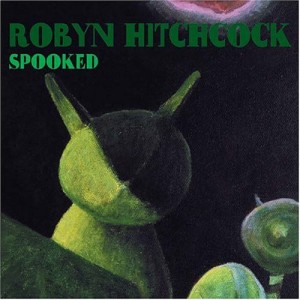
view/request
In 2004, Robyn Hitchcock recorded one of his finest albums with folkster heroes Gilllian Welch and David Rawlings. The trio set up shop in Nashville, TN and created this very sparse and absorbing recording. The album is filled with rich textured harmonies, picking acoustic guitars and a refreshing amount of open space. Though mostly an acoustic record, the album also features spots of electric piano, minimal drums, electric sitar for psychedelic touches and Eastern flavor and a couple electric bass guest spots by NRBQ man Joey Spampinato.
On the dobro led “We’re Gonna Live in the Trees”, Hitchcock’s famed clever lyrics bounce the literary reference of Virginia Woolf had a troubled mind, it was never at ease with the song’s title/refrain. He also shows a softer side with the slow and outer-spacey “English Girl”. Her skin was clear and her mum wore pearls/I fell in love with an English girl/ She asked me for an almond whirl/ I was obliged to the English girl.
Robyn Hitchcock is one of the few recording artists whose catalog has remained consistently inspired throughout a lengthy career. Spooked, in particular, stands out from his recent output due to the stunning contributions from Welch and Rawlings.
Reviewed by Jason
Tagged: Folk music, Music, Psychedelic, Rock music
Now
by Bhagavan Das
[Music CD]
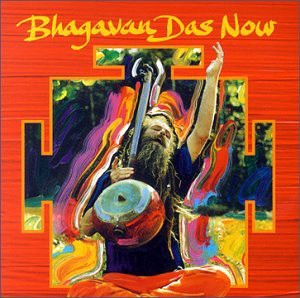
view/request
This is a very interesting recording. Bhagavan Das sings traditional kirtans and bhajans, or devotional songs, from India, and his performance shows his deep familiarity with these traditions while simultaneously embracing a very modern sound. This is in part due to Das’ collaboration with the album’s producer, Mike D of the Beastie Boys, who contributed samples and loops which give the album a very modern feel, but don’t, perhaps surprisingly, feel the least bit out of place. In addition, Das is accompanied by a wide range of musicains playing instruments from the east and from the west, traditional and modern. We hear guitars and ektar, drum sets and tabla, sarangi and synthesizers, harmoniums, organs, and conch shells. We can also hear the influence of the blues, the Beatles, and traditional Indian singing styles.
Every track on this album is powerful, energetic, and alive. Every word is heartfelt. I’ve only had a chance to listen to this album once so far—but I’m very much looking forward to listening to it again.
Reviewed by Ben
Tagged: Hip-Hop, Religion, Yoga
The Union
by Elton John & Leon Russell
[Music CD]
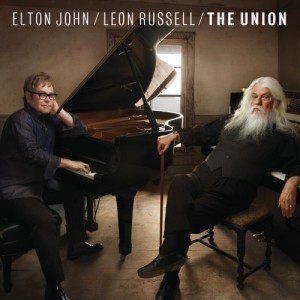
view/request
The Union exists as one of the finest statements of friendship that the recording industry has seen. The origins of this album began when Elton John was listening to a vintage Leon Russell recording and burst into tears. The two hadn’t spoken since they toured together in the early 1970’s when John first came to America. Russell, being an early hero of his, had also become a nearly forgotten footnote in the history of popular music.
Leon Russell, a member of Phil Spector’s infamous Wrecking Crew, the pianist and arranger for the Concert for Bangladesh and critically lauded solo artist of the 1970’s, had been releasing music with little distribution or fanfare from his website for the last couple of decades. Elton saw it as his mission to reintroduce audiences to Leon’s brilliant catalog and release him from obscurity. He approached his childhood idol to work on some material together and also selected T-Bone Burnett to handle the production.
The result is a stunning collaboration drawing influence from New Orleans jazz and blues, gospel, soul, country and the Jerry Lee Lewis brand of rock n’ roll. The two piano men trade licks like they are dueling at a honky-tonk and modestly share vocal duties as much as two legends can. Though Elton certainly hasn’t sounded this good since his classic years, it’s Leon who steals the show. Russell’s “In the Hands of Angels”, a song about dying sung in his withered drawl, is by far the standout track.
I believe the saying is “you can take the man from the Lion King, but you can’t take the Lion King from the man”. Yes, there are those moments where Elton is delivering the soaring power ballad chorus, but these occasions are few. The Union feels at home alongside Elton’s Tumbleweed Connection and Leon’s spectacular self-titled record. It’s the 70’s… just forty years later.
Reviewed by Jason
Tagged: Buddies, Pop music
Black Dynamite
by Adrian Younge
[Music CD]
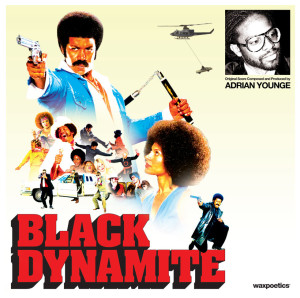
view/request
Seeing that this is most likely my last post of the year 2010, the natural thing to do would be to compile a best of scroll displaying my favorite things (much like Miss O. Winfrey) from the last three-hundred and sixty some odd time tracking units we shall call “days”. My reply to the reader’s expectation will be as follows, “why, I’m an improviser… I don’t even bring a list to the grocery store!”
And so we raise our glasses to the great compromise. In an action packed year filled with exceptional new music, I will have to award Adrian Younge’s Black Dynamite Sound Orchestra for putting on the best concert of this year. It was a small, intimate show at Ars Nova that cooked and cooked and cooked… and then cooked some more. The band, decked in matching white tuxedos, was gracious enough to corral the audience upstairs for cocktails following their first blistering set. After meeting this very friendly group of musicians, I was invited to see the evening’s second show.
Before attending the concert over the summer, I was familiar with the record pictured in this post’s left hand corner and enjoyed the funky, dirty and melodic blaxploitation soundtrack stylings. I say “blaxploitation” because the album is a soundtrack to a new film that very successfully (in the most comedic sense) rubs elbows with the likes of John Shaft, B.J. Hammer and Dolemite films. Younge, composer/multi-instrumentalist/film editor, hearkens back to the music of these 70’s classics by working with vintage equipment and recording straight onto analog tape. While retaining the spirit of something like Mayfield’s Superfly with chilling vocals by many guest artists and tapping into haunting arrangements reminiscent of Ennio Morricone, Younge somehow takes this retro sound and genre and carries us into a completely new listening experience.
And so at the curtain of 2010, it is announced that Younge and co. are finishing up a follow-up and a release date has been set. It appears we have our first candidate to help keep the pace of this wonderfully musical year.
Reviewed by Jason
Tagged: Funk, Jazz, Soundtrack












